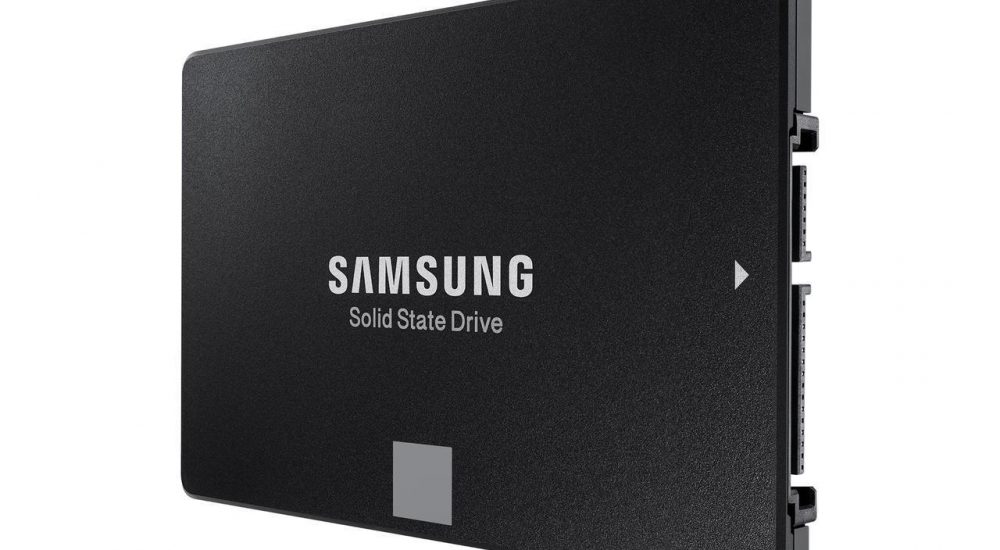Faster and longer-lasting than the 850 Evo, yet still competitively priced, this is the new king of SATA SSDs
Pros
- Exceptionally fast
- Long lifespan
- Reasonable price
Cons
- Modest sequential write speed increase
Even if Samsung’s smartphones tend to play second fiddle to the ever-popular iPhone, the Korean firm looks an awful lot like the best in the world at consumer-grade storage. Besides the 960 Pro and 960 Evo setting the standard for NVMe drives, there’s also the (much more affordable) SATA-based 850 Evo – its rapid read/write speeds were excellent in 2014, and they still hold up today.
Perhaps that’s why it’s taken so long – surprisingly long, in fact – for a replacement to arrive. The Samsung 860 Evo initially appears to be a rather minor update: it still uses stacked V-NAND memory and the 6Gbits/sec SATA 3 interface, and the advertised sequential write speed has been modestly increased from 540MB/sec to 550MB/sec. The quoted write speed hasn’t changed at all, sticking at 520MB/sec. You get the same choice of capacities as well: 250GB, 500GB, 1TB, 2TB and 4TB. This time, the two largest options are available at launch, instead of coming months or years later.
Instead, it’s endurance that Samsung wants to focus on improving, both for this and its (supposedly) faster, more expensive counterpart, the 860 Pro. This comes in the form of more durable V-NAND, and gives some sizable lifespan extensions in terms of TBW (terabytes written – or the amount you can write to the drive before you can expect it to start failing).
The 250GB model we were sent, for instance, can survive 150TBW, double that of its 850 Evo equivalent. But it’s further up the capacity list where we start to see truly massive increases: whereas the 1TB 850 Evo was quoted at 150TBW, the 1TB 860 Evo is 600TBW, and if you can afford the 4TB model, that goes all the way up to 2,400TBW, from 300TBW on its 850 Evo equivalent.
Having been on the wrong end of both catastrophic hard disk failures and frustratingly slowed-down SSDs, any effort to extend the period of peak performance for a storage drive is more than welcome to us, even at the apparent expense of being able to focus entirely on generational speed improvements. However, that doesn’t mean that the 860 Evo has neglected such upgrades and, as a result, this is one exceptionally fast SSD.
In fact, in CrystalDiskMark’s sequential read test, it actually surpassed Samsung’s listed speed, hitting 562.5MB/sec, and then did the same in the sequential write test, with 532MB/sec. Even more impressive was how it kept composure in the much tougher 4K random tests, scoring 401MB/sec read and 364MB/sec write.

Switching to our own file-copying benchmarks, the 860 Evo performed superbly in the huge files test, averaging a read speed of 492MB/sec and a particularly quick write speed of 545MB/sec. Things got a little strange in the large files write test, as we ended up with an average of 655MB/sec, which shouldn’t be possible with SATA 3’s throughput limits. This is a Windows issue, as the OS can state that the transfer is complete before it actually is, continuing the operation in the background. The good news is that this is how fast the drive will appear in Windows, so it’s still representative of blazing real-world performance. The large file read test also returned an average of 478.8MB/sec, another top-tier performance.
Judging by our small-files test, mass-moving lots of little pieces is the only area where the 860 is good rather than great: here, it scored 274MB/sec read and 504MB/sec. The old 850 Evo did better here, funnily enough, but then the 860 Evo beats its predecessor by considerable margins in the huge and large files tests, so we’d say it’s the faster SSD overall.
What’s really interesting, however, is that the 860 Evo looks to be faster in certain situations than the 860 Pro, but a quick run of the 256GB model in CrystalDiskMark had the more expensive Pro at 361.SMB/sec for sequential read speeds and 531MB/sec for sequential write speeds. These are still excellent scores for a SATA drive, but not quite as good as the 860 Evo’s.
Samsung 860 Evo 250GB review: Verdict
Best of all, the 860 Evo isn’t some overpriced luxury: the cost per gigabyte is perfectly reasonable for a 2.5in SSD of this calibre, at 32.8p for 250GB, 30.4p for 500GB, 29.6p for 1TB, 30.8p for 2TB and 31.3p for 4TB. Compare that to the 860 Pro, which ranges from 48p for the 256GB model to 37.5p for the 4TB model, and it becomes the same story as Samsung’s other PC storage releases: just like the 850 Evo and 850 Pro, as well as the 960 Evo and 960 Pro, it makes more sense to get the cheaper (but still fantastically fast) Evo version.
Finally, then, we have a worthy alternative to the 850 Evo, and it’s the very SSD intended to replace it. Whether you’re planning a new PC build or switching from solely mechanical storage for the first time, there’s no contest: this is the best SATA SSD you can buy.
Source: expertreviews.co.uk




































